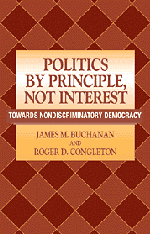Book contents
- Frontmatter
- Contents
- List of figures and tables
- Preface
- Acknowledgements
- PART ONE INTRODUCTION
- PART TWO ANALYSIS
- PART THREE APPLICATION
- 6 Generality and externality
- 7 Market restriction and the generality norm
- 8 The political efficiency of general taxation
- 9 Deficit financing and intertemporal discrimination
- 10 Generality and the supply of public services
- 11 Generality and redistribution
- 12 Generality without uniformity: Social insurance
- 13 Generality without uniformity: Federalism
- PART FOUR PROSPECT
- Endnotes
- References
- Index
6 - Generality and externality
Published online by Cambridge University Press: 27 March 2010
- Frontmatter
- Contents
- List of figures and tables
- Preface
- Acknowledgements
- PART ONE INTRODUCTION
- PART TWO ANALYSIS
- PART THREE APPLICATION
- 6 Generality and externality
- 7 Market restriction and the generality norm
- 8 The political efficiency of general taxation
- 9 Deficit financing and intertemporal discrimination
- 10 Generality and the supply of public services
- 11 Generality and redistribution
- 12 Generality without uniformity: Social insurance
- 13 Generality without uniformity: Federalism
- PART FOUR PROSPECT
- Endnotes
- References
- Index
Summary
Life in a community is characterized by a variety of relationships with one's fellow community members. In a small community, these relationships may be entirely informal. Trading partners and neighbors may acknowledge mutual spheres of influence and trust which are understood only by the participants. Casual acquaintances may similarly acknowledge reciprocal duties of courtesy, assistance, and distance. Strangers may also interact within fairly well understood, if limited, rules of conduct. In a larger community, many of these informal relationships are formalized as law and regulation, and the somewhat less discerning, but stronger, sanctions of the village constabulary or state police replace those of neighborly disapproval and vendetta.
Although life within a community takes place within a complex web of rules and regulations, it is generally acknowledged to be superior to the life of a solitary unaffiliated person, a hermit, who escapes from the various rules governing life in a community. A community offers numerous opportunities for realizing increased personal wealth derived from trade among specialized producers as well as richer opportunities for consumption, fellowship, and education. These advantages evidently more than compensate individuals for the various formal and informal restrictions of life in a community.
Although adhering to the various rules and regulations associated with life within a community is clearly a burden for most individuals, the origins of many of those rules is based on mutual advantage. That is to say, many of a community's formal and informal regulations are not simply an unfortunate cost of life within a community, but rather a significant part of the reason why life in a community can be advantageous.
- Type
- Chapter
- Information
- Politics by Principle, Not InterestTowards Nondiscriminatory Democracy, pp. 61 - 75Publisher: Cambridge University PressPrint publication year: 1998

